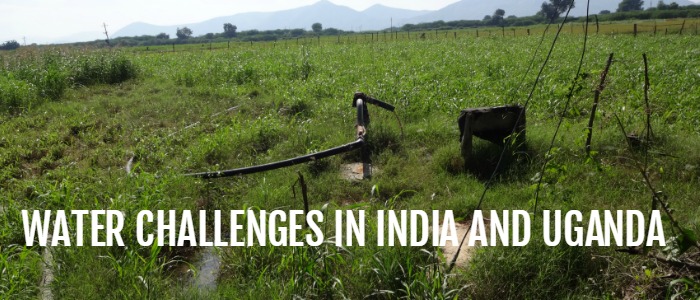
Water challenges in India and Uganda
Water security is increasingly characterized as one of the top global risks of the 21st century (World Bank 2016). Improved water provision is right at the top of the agenda for big development actors, as access to clean water is a key component for improving various other important areas including education, health and the economy. In addition, the growing scarcity of available clean water is a real risk, growing populations and higher living standards alongside poor management of water are leading to a greater demand for water, and an increasing scarcity of water. This scarcity, inevitably, leading to high migration rates and conflict risk. The two countries in which drop4drop operates, India and Uganda, are both facing water related issues.
India has just come out of a severe drought, following two successive years of water shortages there has been increasing pressures on its water sources, and has created significant pressures on the government to improve the supply of water and has led to bold decisions such as modifying water arrangements with its neighbor, Pakistan. In early 2016, India saw its lowest water availability in a decade – with reservoirs at 29% of their total storage capacity (Central Water Commission 2016), and the third largest river in the world flowing directly through India, the Ganges, having depleted by a fourth.
Reckless usage of water is a real factor in causing depleting water stocks in India. Over extraction of water for agricultural purposes, without monitoring measures in place is seeing farmers using up 90% of all water usage in India alone. Further, incorrect disposal of waste has led to diminishing water quality sources and rivers literally turning into sewers!
However, the government are increasingly taking more of a proactive approach in addressing the water crisis, investing $165 billion water diversion scheme for drought-prone regions to supply water to thirty-seven regions, alongside active NGO’s like drop4drop, implementing clean water and educational programmes to better improve water management.
Uganda is also suffering from water scarcity, with a growing demand as the country’s population grows at a rate of over 3.3% annually (World Bank 2015) due to high fertility rates (estimated at 5.7 children per woman) and a large influx of immigration from South Sudanese Refugees. Poor management of water is also an issue, with very high rates of contamination. Both factors combined result in only 65% of the population having access to safe drinking water. However Uganda is a growing nation, and seeing transformational change from agricultural to an industrial country, seeing a real reduction in extreme poverty in the past thirty years, accounting for the second fastest reduction in poverty rates in Sub-Saharan Africa!
In both India and Uganda, much more work needs to be done. DROP4DROP is providing critical intervention in relieving water pressures in the local areas where we work, using teams of local experts to build and maintain reliable boreholes for the use and ownership of the local community. DROP4DROP continually develops innovative technologies to address the issue of water wastage, which you can read more about in our blog posts!